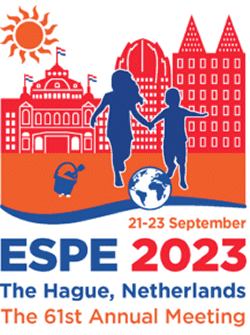
61st Annual ESPE (ESPE 2023)
The Hague,
Netherlands
21 Sep 2023 - 23 Sep 2023
Free Communications
Bone, Growth Plate and Mineral Metabolism
hrp0097fc2.1 | Bone, Growth Plate and Mineral Metabolism | ESPE2023
Hearing loss in pseudohypoparathyroidism (inactivating PTH/PTHRP Signaling Disorder): a prospective study to assess prevalence and predictive factors of hearing loss in 44 patients affected with iPPSD/PHP
Djian Cassandre , Berkenou ugurtha , Rothenbuhler Anya , Botton Jérémie , Linglart Agnès , Nevoux Jérôme
hrp0097fc2.2 | Bone, Growth Plate and Mineral Metabolism | ESPE2023
First Results of the Global ALPL Gene Variant Classification Project
R Farman Mariam , Rehder Catherine , Malli Theodora , Rockman-Greenberg Cheryl , Dahir Kathryn , Ángel Martos-Moreno Gabriel , Linglart Agnès , Ozono Keiichi , Seefried Lothar , del Angel Guillermo , Högler Florian , Barbazza Francesca , K John Lisa , M. A. Delana Mudiyanselage Sewmi , Burner Nading Erica , Huggins Erin , T Rush Eric , El-Gazzar Ahmed , S Kishnani Priya , Webersinke Gerald , Högler Wolfgang
hrp0097fc2.3 | Bone, Growth Plate and Mineral Metabolism | ESPE2023
Hyperparathyroidism after three years of burosumab in children affected with x-linked hypophosphatemia
V Zhukouskaya Volha , Ertl Diana-Alexandra , Berkenou Jugurtha , Audrain Christelle , Bardet Claire , Rothenbuhler Anya , Linglart Agnes
hrp0097fc2.4 | Bone, Growth Plate and Mineral Metabolism | ESPE2023
A real-world study in Germany and Switzerland regarding renal health in children with X-linked hypophosphatemia
Böckmann Ineke , Leifheit-Nestler Maren , John Ulrike , Metzing Oliver , Rehberg Mirko , Peter Schlingmann Karl , Kemper Markus , Patzer Ludwig , Weitz Marcus , Wühl Elke , Freiberg Clemens , Sparta Giuseppina , Hiort Olaf , Schnabel Dirk , Hoppe Bernd , Haffner Dieter
hrp0097fc2.5 | Bone, Growth Plate and Mineral Metabolism | ESPE2023
Generation of novel genetic zebrafish models and using RNA-seq analysis to explore the role of ankrd11 gene on bone growth
Shangguan Huakun , Zeng Yan , Zhang Qianru , Chen Ruimin
hrp0097fc2.6 | Bone, Growth Plate and Mineral Metabolism | ESPE2023
Human breast milk-derived exosomes promote growth plate cell lines in vitro
Eren Simge , Kabataş Bilge , Ünsal Naz , Yıldırım Merve , Eren Olcay



